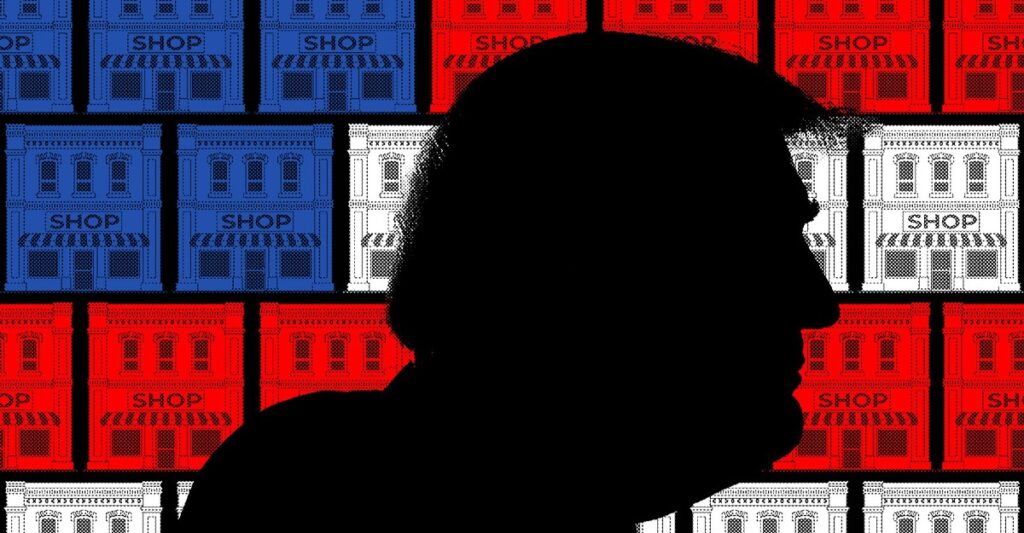The surprisingly expansive levies on imports will open up a future of high prices.
This is an edition of The Atlantic Daily, a newsletter that guides you through the biggest stories of the day, helps you discover new ideas, and recommends the best in culture. Sign up for it here.
“We’re going to start being smart, and we’re going to start being very wealthy again,” President Donald Trump announced today as he laid out a plan that risks derailing America’s economy. At his “Liberation Day” event, he unveiled a 10 percent–minimum tariff on all imports, with no change for Canada and Mexico but significantly higher rates for other countries, such as China and India, that far exceeded what many economists had expected.
With today’s announcement, Trump is tariffing essentially all foreign goods. The administration says that the levies will bring in some $6 trillion, which would amount to the biggest tax hike in U.S. history. Some of the most perplexing updates are in countries where the United States has existing free-trade agreements, such as South Korea, my colleague Annie Lowrey, who covers economic policy, told me. The Trump administration claims that South Korea has a 50 percent tariff on the U.S., but it is basing its tariff estimations in part on currency manipulation and trade barriers. It hasn’t yet provided evidence confirming that such factors, insofar as they exist, are equivalent to a 50 percent tariff.
Such all-encompassing tariffs will cost each American family thousands of dollars, economists predict. Americans will likely feel the effects of this while standing in a grocery-store aisle, purchasing auto insurance, or undertaking home renovations. These levies have the potential to increase inflation and slow down the economy in the longer term, and the uncertainty of what happens next will also contribute to the confidence of shoppers and businesses. “The way that Trump does tariffs is he often makes these really big announcements and then rolls them back,” perpetually modifying the rules, as in a game of Calvinball, Annie explained. “That’s really hard if you’re a business. Should we wait this out? Are they actually going to do it?”
Given the sweeping nature of the new tariffs, Trump may have just essentially encouraged other countries to consider banding together to impose further tit-for-tat levies on the United States. The best-case scenario, Annie told me, is that after some countries threaten reciprocal tariffs, a negotiation is reached that allows Trump to feel like he has won but also “gives some certainty” to businesses and people; shoppers absorb high costs at first, but then the uncertainty declines. If Republicans realize after this whole ordeal that this level of chaos could affect their chances at reelection and opt for fewer surprises going forward, the economy could bounce back, she argued.
America’s economy is full of mixed signals right now—or at least it was, before Trump’s announcement. “If you knew nothing about it and you came in and looked at the main figures, you would say this is not an economy in a recession or anything close to it,” Annie said. The unemployment rate is fairly low, at 4.1 percent; GDP numbers are strong. But things start looking worrisome when you consider that consumer confidence is the lowest it’s been since early 2021, and that Trump’s new tariff plan won’t quell those fears. The solution for the kind of post-tariff downturn the economy might face is simple: Remove the tariffs. But the Trump administration is not likely to let them go easily, Annie noted: “We could be getting ourselves into a bad situation where we’ve taken options for improving the situation off the table.”
Related:
Here are four new stories from The Atlantic:
Today’s News
- Susan Crawford won a Wisconsin Supreme Court seat, beating an opponent backed by Donald Trump and Elon Musk.
- A judge dismissed the corruption case against New York City Mayor Eric Adams and ruled that the charges can’t be brought again.
- An extreme weather event brought flooding, heavy snow, and high winds to the central United States.
Evening Read
The New Singlehood Stigma
By Faith Hill
Just to be clear: Today is, in many ways, the best time in American history to be single.
In the 18th century, bachelors paid higher taxes and faced harsher punishments for crimes than their betrothed counterparts. (“A Man without a Wife,” Benjamin Franklin said, “is but half a Man.”) Single women—more likely, naturally, to be seduced by the devil—were disproportionately executed for witchcraft …
Forgive me, then, if I sound ungrateful when I say this: Americans are still extremely weird about single people. But now the problem isn’t just that singlehood is disparaged; sometimes, it’s that singlehood is celebrated. Relentlessly, annoyingly celebrated.
Read the full article.
More From The Atlantic
Culture Break
Play. The new Nintendo Switch 2 is expensive, Ian Bogost writes. But what if you think of it as an appliance instead of a video-game console?
Ruff day? Take a look at these brave search-and-rescue dogs that help find people after disasters.
Play our daily crossword.
Stephanie Bai contributed to this newsletter.
Explore all of our newsletters here.
When you buy a book using a link in this newsletter, we receive a commission. Thank you for supporting The Atlantic.
Premium IPTV Experience with line4k
Experience the ultimate entertainment with our premium IPTV service. Watch your favorite channels, movies, and sports events in stunning 4K quality. Enjoy seamless streaming with zero buffering and access to over 10,000+ channels worldwide.

















